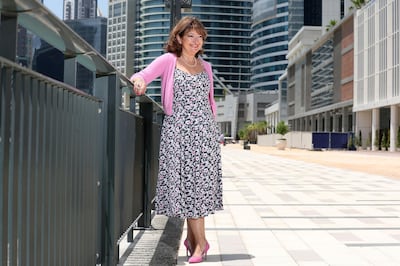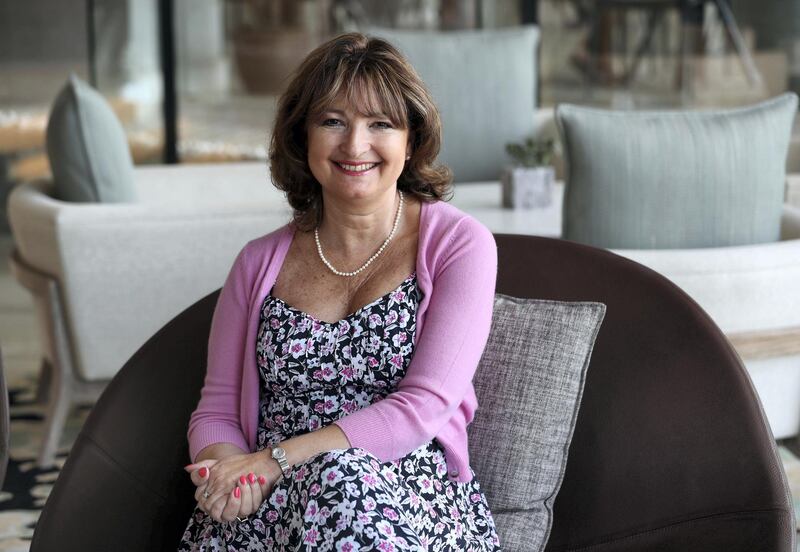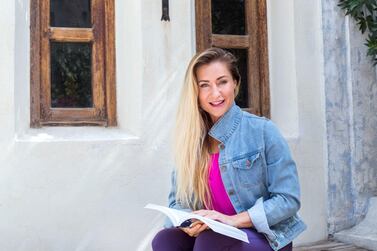Zoë Cousens has been working in the financial services sector for more than 30 years and was one of the first women on the London Stock Exchange floor in 1986. The Guernsey native, 57, moved to Dubai in 2015 and is the founder and director of Castellet Consulting, an independent investment review service with high-net-worth clients from the GCC, the Channel Islands and Monaco. Ms Cousens also founded the Women’s Investment Network in Dubai in February last year with the aim of inspiring women to become financially knowledgeable and independent.
What brought you to Dubai?
I came to Dubai on holiday in June 2014, fell in love with it and decided to move here and set up my own company. I provide a service to wealthy individuals and families to ensure that the investment managers are doing a good job for them.
How did your upbringing shape your attitude towards money?
Well, I lived on an island that is an offshore finance centre, so finance was always part of our lives. I learnt to manage my own money at quite a young age when my father was unfortunately taken very ill and I had to work to put myself through college. I was 17. Having to look after myself and get a job from a relatively young age, very quickly taught me about the value of money and the importance of looking after it.
What was your first job?
I went to college when I was 18 for two years and studied languages, which is my favourite topic. Aside from school jobs, my very first job after college actually wasn’t anything to do with finance. I worked in the sales team for Rochas perfumes, which was a lovely job for young women to work in the perfume and cosmetics industry, where we were given free samples as part of our monthly wage. I don’t have any recollection [how much I was paid].
How did you go from studying languages to finance?
Many years ago there weren’t very many options to use your languages. I was told by the employment agencies that I had two options with languages: to teach or to work in Brussels for the EU. Neither of those two jobs appealed to me. And so, while I was in Guernsey, because there are so many financial institutions there, a lot of us end up working in finance naturally.
How did you end up at the London Stock Exchange?
I went from the West End, where I was working for the perfume company, back to Guernsey. I worked for a bank in Hong Kong for a while and then I went back to Guernsey again. I ended up working for a stockbroker who seconded me to the London office, which is how I ended up at the stock exchange.
What was that experience like?
That was an interesting experience for a young and shy — at the time — woman in the days of pinstripe suits. A lot of the terms that we hear now, such as glass ceilings and gender diversity, hadn’t been invented in those days, so it wasn’t really something that I thought about at the time. I was just there doing a job. Some days were certainly more difficult than others — there were only maybe three of us [women] at the time.
I was what was called a “blue button” — and I still have my blue button badge — which means I was a junior trainee dealer. There was no electronic trading, so it was all via phone and obviously no mobile phones either. A stockbroker would sit in his office and would recommend to his client to buy a certain share. Then the stockbroker would call through to us sitting in the stock exchange in what was called “the box,” a tiny room with a wall of phones. Then I would go up to the exchange and run around trying to get the best price for our clients. It was such a long process.
I was called back to the Guernsey office, so I was only there for about six months. It was a great learning experience for me in many ways. That certainly helped me to overcome my shyness.

Are you a spender or a saver?
I am a little of both. I understand the importance of saving. If I hadn’t been saving for a long time, I wouldn’t have been able to afford to take my leap of faith by moving to Dubai. But I do like to go to the mall and maybe treat myself to a new dress from time to time.
Where do you splurge?
I don’t think splurge is a word that applies to me. When I first moved to Dubai, it was very tempting with so many malls — particularly coming from a small island with very few shops. But I try to be a sensible shopper — an occasional expensive handbag or nice dresses. I suppose the only other treat is an occasional brunch with my friends. I don’t often treat myself to holidays because I live in a holiday destination.
How do you save?
I do regular investment savings plans on a monthly basis, so contributing once a month to a regular savings plan linked to the stock markets, which is a very effective way of saving. It’s what we would call dollar-cost averaging. For me it’s a win-win strategy. If the markets are going up, obviously you feel happy because you’re making more money. But you can also feel happy when markets are falling, because that month you will buy more shares for your money. And over time, that regular investing in the markets as they go up and down compounds up into a good savings pot. I tend to do most of my saving [in Guernsey] because I’ve held accounts there all my life.
Do you have a specific percentage target for saving?
That’s a question I get asked a lot. It would be nice to have a set target in a way, but people’s circumstances — particularly when you’re living an expat life — change so frequently. And I’ve seen people who have set themselves a target of say 20 per cent of their salary and then sometimes they can’t meet it and so they stop altogether, which is disappointing. I think it’s much better to keep some flexibility in accordance with your discretionary spending. In other words, sometimes it’s a good idea to invest the minimum amount you know you can afford and then if from time to time you have a bonus or a little extra in your account, to top your savings plan up with that.
Do you have any financial regrets?
I think many of us think we could have saved more. In your 20s, savings doesn’t seem important. In your 30s, you’re probably putting everything in a house. In your 40s, you’ve got university fees [for your children]. So there’s always something else important to spend our money on.
I started saving too late — like most of us do unfortunately — which is why I am trying to encourage women in particular through WIN to save and invest for their own futures. Unfortunately, as women we’re often left on our own — we live longer, so due to bereavement or perhaps divorce. And I meet many ladies who wish they hadn’t been entirely dependent on their husband to look after the finances.
What is your biggest financial milestone?
Without a doubt, paying off the mortgage last year. It took 20 years. It felt extremely liberating that my biggest asset is now mine and not the bank’s.
What is your retirement plan?
I may be 57, but I don’t have a retirement plan. I’m waiting to see what the world has in store for me next. I certainly have no plan to stop working because I enjoy it too much. I would like to stay in the region for longer, but if my work takes me elsewhere, that’s where I’ll go.









